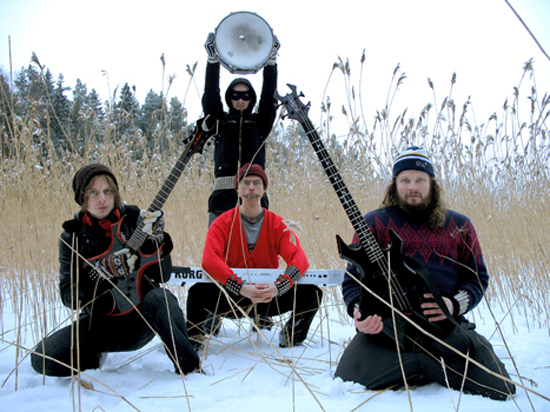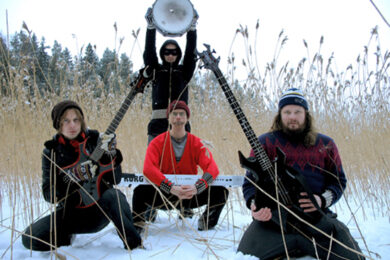Circle are an experimental rock group that, over the past two decades, have come to occupy a particular and unique position within the landscape of contemporary underground music. Formed in the Finnish city of Pori in 1991, their relentless explorations across a multitude of genres – from space and krautrock to the outer reaches of ambient – began with their 1994 debut Meronia, a gleaming cross pollination of post-rock space and punk rock aggression. It came complete with the group’s own internal language, Meronian, a tribute to their primary inspiration, French prog pioneers Magma. And like Magma’s founder Christian Vander, bear-like bassist/vocalist Jussi Lehtisalo has been anchor and leader of Circle from outset, leading an ever-shifting line up of musicians to release one endlessly creative album after another through their label Ektro. Their catalogue boasts a profusion of albums that are breathtaking in both precision and prolificacy, from the elliptical chill of Andexelt to the meticulous and mechanical output of Prospekt. In recent years Circle have stabilized their membership and increasingly taken to the road. With the accessible, rock-oriented feel of albums such as Sunshine and Taantamus, and with a healthy taste for good old-fashioned showmanship, they’ve become an extraordinary live attraction. To witness vocalist Mika Ratto in full operatic cry at the core of Circle’s churning maelstrom is an experience never to be forgotten. For Circle, the ever restless entity, destinations are irrelevant; the journey is paramount.
By contrast, their side project Pharaoh Overlord has a singular goal in mind. Beginning as an instrumental outfit comprising Jussi Lehtisalo, Janne Westerlund and Tomi Leppanen in 2000, their every move has been characterised by the pursuit of the perfect riff to infinity. Their debut was a paean to stoner rock that glowered with hallucinogenic intensity, but more recent works such as 3 distilled that fire into colder, more ambient expressions of the same spirit. 4 found the group finally unleashing the latent metal aspirations that have come to dominate their current live incarnation: their astounding performance at Roadburn earlier this year has already passed into legend.
We spoke to band leader Jussi Lehtisalo ahead of Circle and Pharaoh Overlord’s much anticipated appearances at this weekend’s Supersonic Festival.
Infektio is the band’s 35th album in twenty years. How do you remain inspired to be this prolific?
Jussi Lehtisalo: We don’t congregate that often, but when we do, we put all the excitement of reunion into making new music and recording it. There are no limits in creativity and there’s no reason to make such limits when working with a rock band.
Despite being tagged as experimental or progressive, as a band you seem to exist without any definition or category. How important are your changes of direction, your continual reinventions/transformations?
JL: I don’t remember who is behind this quote, [but it’s] something like ‘You can see the future by looking back into the past far enough’. This describes our activities somehow. In the abstract sense, we concentrate in drawing a third picture, which occurs to be the same every time. Like, the methods are changing but the same cat and the same umbrella appear on the canvas over and over again.
The line-up of the band has always been fluid and flexible, and you’ve recently expanded to include new members Ash Bowie and Pekka Jaakselainen. How do you view the evolution of the group, with your older and latest line-ups?
JL: Art is more important than the artists. Circle is the loyal lover into whose arms it is easy to cast oneself. We keep on ranting, and sometimes it seems as spectacular development, sometimes as regressive floundering.
You’ve become greatly renowned for being an extraordinary live band – your sets at this year’s Roadburn festival, as Circle and as your other group Pharaoh Overlord were rightly hailed as highlights of the weekend. What are your memories of those festival performances?
JL: I’m very happy to hear that. I remember we focused on our shows very well and put in all the effort and excitement we had. The highlight for me was to share the stage with Bruce Duff from Jesters of Destiny and to play two songs from their Fun At The Funeral album.
What would you say are the differences and similarities between Circle and Pharaoh Overlord? What separates one from the other?
JL: They are becoming more and more alike to each other. The purpose is that eventually they become inseparable. We will lose the headline under which we operate.
What part does your other offshoot band Steel Mammoth play in all of this? What is the focus of this latest outlet?
JC: We play straight rock’n’roll, and lately we have been oriented towards punk – more romping output, so to say. We try to keep the music primitive and amateurish and I think we have succeeded fairly well. By the way, our latest album Nuclear Rebirth will be out soon.
At Roadburn you once again worked with Jesters of Destiny vocalist Bruce Duff: is there a chance you will be bringing him over for your appearance at this year’s Supersonic festival in Birmingham?
JL: Unfortunately Bruce won’t be attending Supersonic. Still, we are hoping to perform with him some time in 2012 or 2013.
Its been five years since you last performed at Supersonic. What do you remember of your last appearance there in 2006, and do you have anything special planned for this year’s event?
JL: I dare say that we are in a pretty good shape at the moment. So I believe that after this year’s show the 2006 Circle performance will be erased from our minds, like the losers’ versions of historiography in schoolbooks.
Esko Lonnberg’s documentary Saturnus Reality and its partner, Petri Hagner’s Man with a Video Camera are bizarre but endlessly intriguing films that concentrate on Circle, your working methods and the significance of your music. How did these films come about, and what do you feel they say about the band?
JL: These films were made very intuitively. They are a splendid characterization of our friendship, our music making methods and the clumsy rituals that we do in order to tune into the inspired state of self-humiliation and overpower.
What do you feel is the future of the band, and what does Circle have left to achieve?
JL: It seems like Circle is becoming more and more important for ourselves, the excitement is growing. On one hand I hope that we will break loose from all conventions, on the other hand I hope that we will give up our personal sense of aesthetics and dare kiss the ass of mass culture. We will bravely open ourselves up and let our self-made work of art take us wherever it has to take us.
There should not be anything to achieve for musical ensembles of any kind. The job of bands is to create music. The culture industry has really succeeded in making up some ridiculous goals and priorities, and thus dazzling even the darkest and sharpest underground. It makes me sad to see that most bands have drawn bizarre conclusions from this, and have decided to fade and quantize the slightest hints of wobbling in their hands.
We should realize that the idea of achievement is always given from the outside authorities to the core. The first premise is that a group has to be able to put aside all the interfering noises and shoot the music out so that the good climaxes into superior, the average flops into pitiful and all the imaginable things in the middle.



